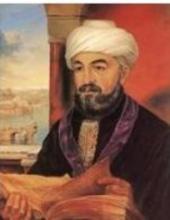One thing to remember about the great sages of Jewish philosophy is that they were not monks studying away in cloisters. They were some of the most prominent, worldly men of their time. In many ways, they were international celebrities. After all, they were the keepers and producers of knowledge both spiritual and secular. In a time when religion was the core of governance at every level, no figure beside the king himself was more revered and respected than the religious scholar. As with any celebrity, a sage was not immune to the pitfalls of tabloid drama. Late in his life, a great commentator called Nachmanides was at the center of a controversy than involved King James I of Aragon himself.
Rabbi Moshe ben Nachman Gerondi, aka Ramban, aka Nachmanides was a 13th century scholar originally from Girona in Christian-controlled Spain. Moshe lived in a highly respected, educated family. He grew to be a professional physician while his brother Benveniste de Porta was a very successful financier who was granted a post by King James himself. The King's respect for the family would prove to be vital later in Moshe's life.
By the age of 16, Ramban had already cultivated fame as a formidable Judaic scholar. He made an early career of addressing long-standing philosophical debates and attempting to reconcile them. Though he had many strong beliefs and could be extreme in the conservatism of his views, Ramban was only hard-nosed when it came to deep spiritual matters. Where human issues were concerned, he had and maintains to this day a reputation for gentleness and peace-making.
As it is often the tradition in Jewish philosophy to pit two sages against one another, Nachmanides is considered the counter-point to the teachings of Maimonides, who was already a widely revered scholar by the time Nachmanides began writing. Maimonides often strikes a very classical, humanistic stance, thanks in no small part to his lifetime of globetrotting. Nachmanides rejects at least half of Rambam's positions on the grounds that they are overly influenced by Greek philosophy and occasionally stray into the profane. Ramban certainly had great respect for his forebear, but he was a bit more of a fundamentalist in his own views.
Nachmanides enjoyed a relatively quiet life until July 1263. As the foremost scholar of Judaism in Catalonia, he became the target of a former Jew who later converted to Christianity and became a Dominican monk, taking the name Pablo Christiani. Christiani was sent to engage Ramban in a Disputation. This was a common practice at the time which the Church used to encourage Jews to renounce their faith. Scholars and other significant figures would be called to defend their philosophy. If they lost the debate, it would demoralize their Jewish followers. Christiani debated Ramban on various topics, mostly concerning Messianic issues.
What sets Ramban's Disputation apart from any other is that Ramban requested and was granted full freedom of speech during the debate. Where other Disputations had strong censorship against anything that might be considered blasphemous (which includes any meaningful rhetoric contrary to Christian philosophy), Ramban's was on even ground. In the presence of King James, Ramban and Christiani debated for four days. In the end, Ramban was essentially declared to have successfully defended his faith. This ruling erupted in a controversy and Ramban attempted to clear his name by publishing the transcript of the Disputation. This only inflamed things further, resulting in his exile and a hefty fine. Though the exile was de facto permanent, the fine was lifted as a favor to Ramban's brother.
Nachmanides eventually found his way to Jerusalem where he established a synagogue. That synagogue stands to this very day in the Old City. It's a small, unassuming building that has no indication of its importance other than a faded plaque by the one and only door. At the time, very few Jews actually lived in Jerusalem thanks to the constant wars in the region. Ramban's presence there may have saved Jewish culture in Jerusalem from fading forever. He died at the age of 73, though his burial place is unknown today.
